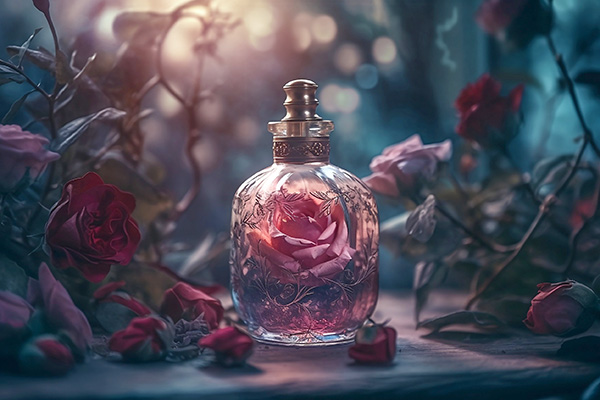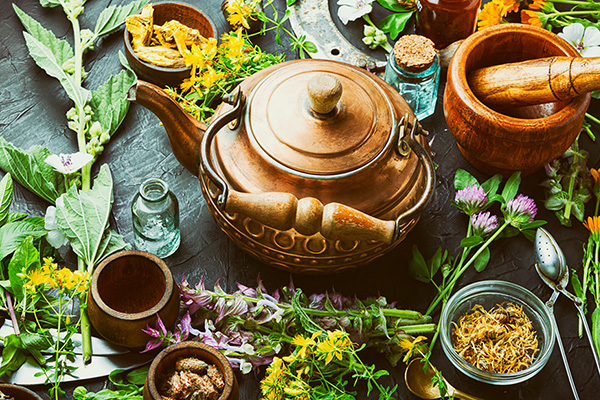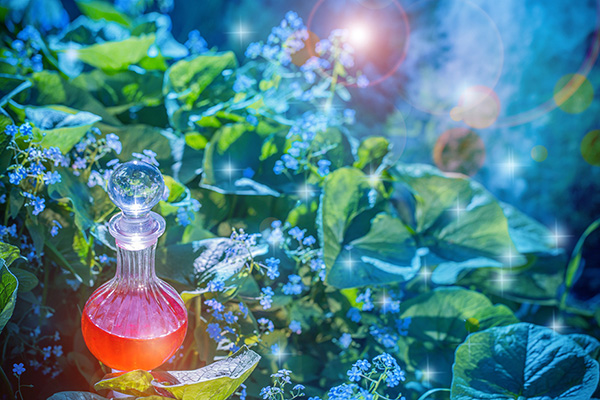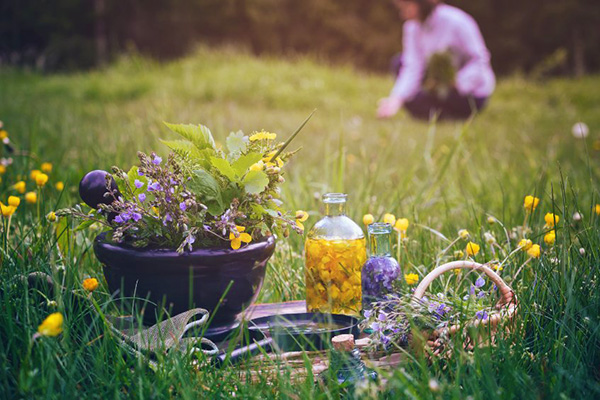herbalist
The Subtle Psychic Power Of Flower Essences
 Flower essences are one of my favorite spiritual resources. These vibrational imprints of flowers in water, preserved with alcohol, are a powerful tool for personal and spiritual development. They have been used for centuries to promote emotional well-being, balance and healing.
Flower essences are one of my favorite spiritual resources. These vibrational imprints of flowers in water, preserved with alcohol, are a powerful tool for personal and spiritual development. They have been used for centuries to promote emotional well-being, balance and healing.
I come from a long line of female herbalists on my mother’s side of the family. They were seers, healers and mystics who combined their psychic gifts with natural healing practices.
That’s why I’ve always been interested in the metaphysical properties of plants, especially herbs and flowers. I love to alchemize them into tinctures, potions and remedies!
The main reason I love flower essences and remedies in particular is that, unlike essential oils and herbal remedies, flower essences are easier and safer to work with on a subtle energy level over the long term, making them particularly effective for enhancing psychic development and spiritual growth.
Flower essences were popularized in the early 20th century by Dr. Edward Bach. He was a British homeopath and bacteriologist who believed that the dew collected from flowers contained the healing properties of the plant. His research led to the creation of the Bach Flower Remedies, a set of 38 essences, each targeting a specific emotional state.
Bach’s remedies were based on the idea that certain flowers have healing properties that can help balance emotional states and promote overall well-being. Dr. Bach believed that emotional and mental states significantly influence physical health, and by addressing negative emotions, one can facilitate healing and prevent illness.
The Modern Practice Of Spiritual Healing
 In a world driven by science and technology, the value of our spiritual health is rarely recognized or appreciated these days, yet it is an essential aspect of our holistic health and well-being.
In a world driven by science and technology, the value of our spiritual health is rarely recognized or appreciated these days, yet it is an essential aspect of our holistic health and well-being.
The truth is that spiritual healing has been practiced since the beginning of time to promote physical, emotional, mental and spiritual well-being. Our ancestors were much wiser in this regard. They had a holistic view of health and wellness that not only focused on the physical and mental, but also honored the spiritual or metaphysical aspects of our existence.
In ancient Egypt, for example, illness was treated as a battle between good and evil, and magical remedies were used in addition to herbal medicines. In ancient Greece, holism underpinned everything, and the soul, mind, and body were considered one.
In Traditional Chinese Medicine, a holistic system practiced for at least 23 centuries, healing is achieved by balancing the yin-yang life force energies that permeate everything in the universe. In the indigenous healing traditions of Native America, holistic health is represented by the four quadrants of the ‘medicine wheel’ or ‘sacred circle,’ namely the physical, emotional, mental, and spiritual states of being.
In Christianity, spiritual healing is documented with many references to the healing power of faith and prayer. The Bible also refers to the spiritual gift of healing, and there are several accounts of Jesus performing miraculous healings. In Hinduism, Ayurveda is a five-thousand-year-old Vedic system of medicine that seeks to restore the balance between the body, mind, and spirit.
The Empowering Symbolism Of The World Card
 The World card in the Tarot remains one of my firm favorites. I am all for personal and spiritual growth, the completion of cycles, and new beginnings. The World represents exactly that: the ending of a cycle and pause in life, before the next major cycle begins with the fool.
The World card in the Tarot remains one of my firm favorites. I am all for personal and spiritual growth, the completion of cycles, and new beginnings. The World represents exactly that: the ending of a cycle and pause in life, before the next major cycle begins with the fool.
The journey from the new beginnings of The Fool to the fulfilling endings of The World is a constant evolutionary process in our everyday lives that is represented by the sequence of the 22 Major Arcana cards of the Tarot. The World is the 22nd trump and therefore final card of the Major Arcana.
I have reflected on the imagery of the Rider-Waite version of this Tarot card in great detail. Rider-Waite is probably the most popular and universally recognized Tarot deck. The illustrations by Pamela Colman Smith at first glance appear simple, but the details and backgrounds feature abundant mystical symbolism.
The World pictures an empowered figure within a wreath – traditionally a symbol of victory, success, achievement, and eternal life. The figure holds a wand in each hand, which is reminiscent of the Magician card and the Two of Wands. However, while The Magician holds only one wand, the two wands in the The World card represents fulfillment, wholeness, balance and coming full circle.
The card is framed by four animals on the diagonal. The depiction of these four creatures parallels the four animal symbols used in Christian art to represent the four Evangelists, namely Matthew, Mark, Luke, and John. The four animals also represent the zodiac signs of Taurus, Leo, Scorpio, and Aquarius, the four fixed signs in Western Astrology, which in turn represent the classical four elements of Earth, Fire, Water and Air.
Developing Your Herbal Intuition
 Herbal medicine is becoming increasingly popular, and many people are increasingly turning to herbalism as a healthcare supplement, or even a substitute to conventional pharmaceutical medicine. Plants, flowers, and herbs all have unique energetic qualities that make them suitable for various purposes. They are alive and respond to their environment and how they are treated in the same way humans do.
Herbal medicine is becoming increasingly popular, and many people are increasingly turning to herbalism as a healthcare supplement, or even a substitute to conventional pharmaceutical medicine. Plants, flowers, and herbs all have unique energetic qualities that make them suitable for various purposes. They are alive and respond to their environment and how they are treated in the same way humans do.
When we think of herbs, we tend to narrowly categorize them according to the medical conditions they can be used for, or what aspect of our health and wellness they can improve. However, like people, herbs are much more complex and multi-faceted, and have many uses and applications, alone or in combination with other herbs.
To obtain the most benefit from any herb, we need to take the time and have patience to truly get to know the herb. When you meet someone for the first time at a social event, would you diminish the other person’s true worth by instantly deciding they have only one useful trait or redeeming quality, and leave it at that? Taking the time to get acquainted with a particular herb is much like getting to know someone in an intimate friendship.
Selecting herbs to work with or draw upon for healing is a highly intuitive process. The appearance, aroma, taste, texture, and energy vibration of the ideal herb for a specific purpose must speak to us mind, body, and soul. They convey a distinct energy signature and frequency of healing that the intuitively aware user will innately know is best to use at that time.
The Healing Energies Of Plant Spirits
 Here in Latin America there is a rich tradition of herbalism and ceremonial, shamanic spiritual medicine. There has also been in recent times a global revival of plant medicine and natural healing practices, as well as a renewed interest in related indigenous wisdom traditions found in many cultures all over the world.
Here in Latin America there is a rich tradition of herbalism and ceremonial, shamanic spiritual medicine. There has also been in recent times a global revival of plant medicine and natural healing practices, as well as a renewed interest in related indigenous wisdom traditions found in many cultures all over the world.
As a result of modern science, we have largely abandoned and forgotten the fountain of knowledge the aborigines had regarding healing and natural harmony. It took us several centuries to realize what we have lost and overlooked in the process.
Herbalism is however not only about natural medicine potentially having fewer side effects than modern pharmaceuticals. It is also about the innate energetic qualities we share with a particular plant. This approach to healin stems from a worldview that fully integrates man and nature.
In local tradition, near the Andes, the timing is just as important as the type of plant used for healing purposes. Depending on the season, or the phase of moon, for instance, the plant’s properties will vary, and its effectiveness less than optimal if used at the inappropriate time.
Both the healer and their patient’s attitude towards the plant itself is also an important factor in the healing process, as the respect and gratitude shown to the plant will determine its healing ability.
In shamanic herbalist practices it vital to understand that all entities are considered to have elemental energy, including plants and humans. This is the metaphysical premise of all plant medicine and magic. In fact, for the traditional herbalist all plants have spirits. And each one has specific faculties and properties at different levels or frequencies that can heal us in mind, body and soul.
Energy Work With Lunar Herbs
 The Moon is traditionally associated in healing and metaphysical practices with several flowers and plants, specifically herbs. Many of these herbs are silver, grey, or pale blue, as well as green, much like the Full Moon itself. Many of these plants are also associated with water, or grow near it.
The Moon is traditionally associated in healing and metaphysical practices with several flowers and plants, specifically herbs. Many of these herbs are silver, grey, or pale blue, as well as green, much like the Full Moon itself. Many of these plants are also associated with water, or grow near it.
There are several ways to use herbs in your practice, such as ingesting it in teas or other edible formats, and burning it as incense to purifying ourselves and our living spaces.
During the peak of the moon cycle when it is at its strongest during the Full Moon, is a powerful time to reflect on our emotions, the subconscious, healing, and parts of the body associated with water (blood, digestive system, reproductive system). We can enhance this powerful lunar energy by drinking an appropriate herbal tea, or burning an incense blend consisting of lunar herbs.
Different herbs are associated with the different energies of the lunar cycle. If you are working through some difficult emotional baggage, try lavender, wild rose, lotus, poppy, or kava-kava.
Since the Moon encourages healthy consumption of water and moisturizing, herbs like aloe vera, coconut, chickweed, or marshmallow and aniseed roots act as both natural refreshers and soothers. They are excellent to ensure healthy water absorption, and gels made from aloe are well-known as natural moisturizers.
If you wish to deepen your levels of compassion and understanding during a moon cycle, try mugwort, wormwood, or passionflower. Many of these herbs are edible and delicious. Just be sure to double check first, before adding them to your salad or your teapot!
Healing With Herbs
 The past two years I have turned increasingly to herbs for natural healing. A good friend told me about herbs and how they help her family and I begin to do research. Soon I started taking herbs and have had excellent results.
The past two years I have turned increasingly to herbs for natural healing. A good friend told me about herbs and how they help her family and I begin to do research. Soon I started taking herbs and have had excellent results.
Herbal medicine has gone from alternative to mainstream. The proper use of many common herbs (some of which can be easily grown at home) can help keep you healthy. Try herbal infusions in teas, lotions and soaps to see what works best for you.
You may not know the many uses for these common herbs and plant extracts, so I have compiled a list of those I often use in my personal life:
Ginger – known as the ‘universal medicine’ in Ayurvedic tradition for its many uses, including anti-nausea and motion sickness, digestive aid, and circulatory aid. It can be consumed in powder or fresh form.
Basil – has a spicy scent which can be used to revive faintness. It is also useful for an overactive thyroid, improving one’s concentration, and as an antioxidant packed with Vitamins A and C.
Curry – like ginger it is a popular herb in Ayurvedic medicine. Some of its uses include pain relief, ‘brain power’ to help ward off Alzheimer’s disease, and antioxidant. It also has been shown to improve skin tone.
Peppermint – thought to be the world’s oldest herbal remedy. It is used to combat nausea and vomiting, increase mental stimulation, and boost energy levels. It can also be used as a mild analgesic.
Parsley – in addition to being a popular food garnish it helps prevent gall bladder infections and kidney stones. It’s also loaded with antioxidant and deodorizing properties.